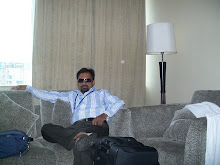STATUS OF TRIBE IN POST INDEPENDENT INDIA: A CASE STUDY OF
DHANKUT LIVING IN DISTRICT BAHRAICH OF UTTAR PRADESH
-Dr. Alok Chantia
Lecturer, Dept. of Anthropology
Sri Jai Narain Post Graduate College
Lucknow, Uttar Pradesh,India
E-Mail alokchantia@rediffmail.com
Keywords: culture, tribe, society, constitution, rights
Abstract:
In spite of listing of tribal groups in pre and post independent India, it is very difficult to
sketch the real tribal groups in present India. Under the Constitutional guidelines
government declares some specific groups as tribal groups on the fulfillment of certain
conditions, which may be termed as observed tribal groups. Due to increase in these tribal
groups fruits of privileges given to actual tribal groups are decreasing. The number of
observed tribal groups have increased leaps and bound in post Constitution India. Actual
tribal groups are still far away from being listed as tribal groups. Anthropologically actual
tribal groups are still behind the curtain and devoid of all basic facilities of life. The case
of a group Dhankut living in District Bahraich of Uttar Pradesh is no different and is
glaring example of violation of human rights of actual tribal people. Dhankut are living
in small pocket of Dhankuttypura of District Bahraich. Dhankut’s total population is
2687(2001 census) and their dialect is dhankutty in a rhythmic form. They practice cross
cousin and parallel cousin marriage which is a taboo in north India and legally prohibited
too under Hindu Marriage Act 1955. Even after having these tribal characteristics they
are not included in the category of scheduled tribe. Neither have they been recognized as
scheduled caste or other backward class. Though they are not agricultural people, cereal
selling is still their main occupation. They are poor and illiterate. With 5% literacy rate
only three of them are in fourth class government job. No literature is available about
them neither in government records nor in district gazetteer. They have full faith in their
traditional panchayat and traditional God “Gullabeer.” They are struggling for their tribal
status since 1973 but have not succeeded so far. Dhankut want tribal status for
themselves to enjoy the benefits provided by the government, but it is a matter of conflict
between observed (constitutionally declared tribes) and actual tribes (anthropologically
identified tribe).All this has created a problem in tribal India too, the latest example of
which is problem of Gujjars in Rajasthan. What are the problems of tribal groups, how
observed and actual tribal groups are struggling and striving for benefits will be discussed
in my proposed paper with the help of socio-cultural life of Dhankut.
*****
Subscribe to:
Post Comments (Atom)

No comments:
Post a Comment